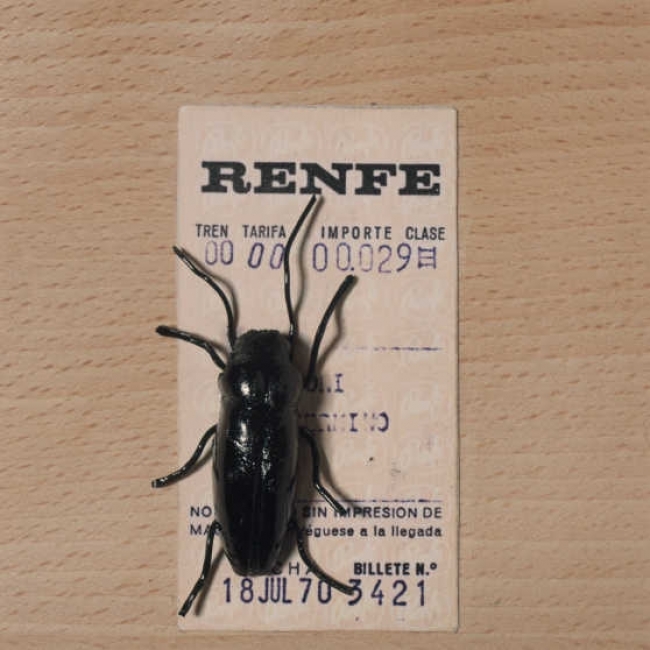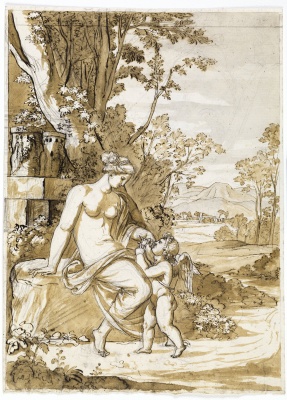Descripción de la Exposición
Dora García’s new work Red Love is inspired by the Russian author, feminist, activist, political refugee and diplomat Alexandra Kollontai (1872–1952) who propagated for radically transformed relationships between women and men. Free love and camaraderie were at the core of her thinking, as expressed in her novels and essays. As an influential figure in the Bolshevik party and commissar for social welfare in their first government, she not only set up free childcare centres and maternity houses, but also pushed through the rights for women including divorce, abortion, and full rights for children born out of wedlock. At the time these were unique measures which were soon overhauled by Stalin, who did not appreciate this attempt at ending “the universal servitude of woman” by challenging both economic and psychological conditions.
García’s exhibition consists of a wooden cage-like structure with a door leading into a space furnished with a big table and chairs. This stage-like space is being used for various purposes during the exhibition period, including by participants of Konstfack’s CuralorLab programme for their final projects. Strong light emanates from a lamp suspended from the ceiling, casting distinct shadows on the floor which has been painted white with a red square in the middle. The square is not perfectly rectilinear, just like the angular shapes in Kazimir Malevich’s paintings. The cage and the lighting bear likeness to a scene in the film W.R.: Mysteries of the Organism.
At the other end of Tensta konsthall’s main exhibition space there is a wooden spiral staircase on which a selection of books has been placed. This atmospheric installation, rich in references, plays on the mission, almost transcendental purpose, and urgency of Kollantai’s life and work, something which is shared by many revolutionaries and artists like Kazimir Malevich. The stairs originate in a museum with a different but no less passionate mission, The Museum of Jurassic Technologies, which was founded in 1989 by a husband and wife in Los Angeles. The museum is defined as “an educational institution dedicated to the advancement of knowledge and the public appreciation of the Lower Jurassic”, a term not further explained. In this exceptional museum, which is reminiscent of a cabinet of curiosities with a collection holding artistic, ethnographic, scientific, and historical objects, some exhibits remain unclassifiable. Part of the collection are a set of maquettes of wooden staircases, one of which came to be the model for the staircase in Red Love.
García’s research-based practice is concerned with modes of political resilience and the production of subjectivity. She is often drawing on psychoanalysis in her work, specifically the theories of Jacques Lacan. Kollontai is yet another dissident figure whose biography and philosophy of action provides an example of emancipatory politics to the artist. Other such figures are the philosopher Félix Guattari, the psychiatrist Franco Basaglia and artist and theorist Oscar Masotta. They are all in some sense deviants, who have experienced marginality. While relating to them either through real or fictional characters, García scripts interventions and installations that transpose these various authors into a presentation to the wider public, mixing politics, performance and the formation of subjectivity. Like a continuous inquiry, García’s work is invested in the performativity of speech and actions and their particular qualities as political tools. Her approach to the exhibition space reflects the structural problems of this emancipatory process, frequently using performative devices which challenge the viewer.
For the academic year 2017/2018 Konstfack’s CuratorLab and Tensta konsthall engaged in a collaborative research project on the life and work of Kollontai. The research project acted as a spring board for García’s new work, using reading sessions as a major tool. Each of the four reading sessions hosted guests bringing their suggested reading, presentations and topics for discussion, including the writer Agneta Pleijel, the medical doctor, writer and activist Shabane Barot, artist Petra Bauer with researcher and critic Rebecka Thor, political philosopher Michael Hardt, writer and philosopher Oxana Timofeeva from the collective Chto Delat?, Aaron Schuster, García herself and the initiators, i.e. head of CuratorLab Joanna Warsza, researcher Michele Masucci and Tensta konsthall’s director Maria Lind.
Self-presentation: Dora García was born in Spain and studied in Amsterdam. As a young artist she moved to Brussels where she lived for 16 years. She participated with the real time theatre in public space “The Beggar’s Opera” in Sculpture Project Münster in 2007, where the character Charles Filch made his first appearance in her work. She has always been interested in anti-heroic and marginal personas as a prototype to study the social status of the artist, and in narratives of resistance and counterculture. In this regard, Dora García has developed works on the DDR political police, the Stasi (Rooms, Conversations, film, 24 min., 2006), on the charismatic figure of US stand up comedian Lenny Bruce (Just because everything is different it does not mean that anything has changed, Lenny Bruce in Sydney, one-time performance, Sydney Biennale, 2008) or on the origins, rhizomatic associations and consequences of antipsychiatry (Mad Marginal book series since 2010, The Deviant Majority, film, 34 min., 2010). In the last years, she has used classical TV formats to research Germany’s most recent history (Die Klau Mich Show, documenta 13, 2012), frequented Finnegans Wake reading groups (The Joycean Society, film, 53 min., 2013), created meeting points for voice hearers (The Hearing Voices Café, since 2014) and researched the crossover between performance and psychoanalysis (The Sinthome Score, 2013, and Segunda Vez, 2017).

Actualidad, 29 may de 2018
#loquehayquever en España: Artium, CGAC, Azkuna Zentroa, Guggenheim y DKV
Por PAULA ALONSO POZA
PhotoEspaña, SCULTO, Prototipoak... Varias de las producciones que abren sus puertas esta semana en España están relacionadas con ferias, encuentros y festivales cuya inauguración es inmediata.

Exposición. 10 mar de 2025 - 22 jun de 2025 / Museo Nacional del Prado / Madrid, España
Cambio de forma: Mito y metamorfosis en los dibujos romanos de José de Madrazo

Formación. 01 oct de 2024 - 04 abr de 2025 / PHotoEspaña / Madrid, España